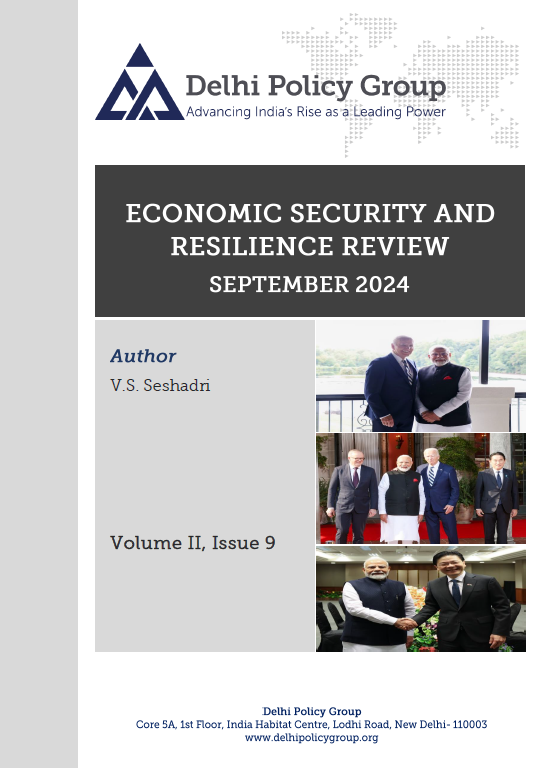Economic Security and Resilience Review
Date: October 08, 2024
The author highlights that expanding cooperation in high technology, manufacturing, semiconductors and clean energy was a key focus in each of the three summit level meetings in which PM Narendra Modi participated during the month.
In Singapore, PM Modi and PM Lawrence Wong reviewed the outcomes of the India-Singapore Ministerial Roundtable under its six pillars of sustainability, digitalisation, skills development, healthcare and medicines, advanced manufacturing and connectivity, and charted a way forward in each of them.
The summit meeting between President Biden and PM Modi in Wilmington delivered wide - ranging outcomes that included a decision to establish a semiconductor fabrication plant that will focus on advanced sensing, communications and powertronics for national security, next generation telecom and green energy applications.
The Quad Leaders’ summit held in Wilmington on September 21 showcased how the initiative is gathering momentum and involving various agencies in the partner countries to emerge as a global force for good in the Indo-Pacific region. The Wilmington Declaration covers several areas, from supply chain resilience to disaster preparedness, and from maritime domain awareness to deployment of digital public infrastructure.
The Minerals Security Partnership Forum (MSPF), of which India is a member, has registered some significant forward movement, as seen from the joint statement issued after the meeting of its principals held in New York on September 27, 2024. It now has an expanded membership numbering 21 countries, and is engaged in 32 joint projects. It has also been bolstered by the formation of a new Minerals Security Financing Network, that includes participation of development finance and export credit agencies of member countries.
This issue also covers export control measures on quantum computing and certain chip-related equipment put in place by the US, which is also proposing to introduce restrictions on the sale of connected vehicles manufactured by China or Russia. Meanwhile, additional duties imposed by the US under its Section 301 on Chinese imports came into force on September 27, 2024.
In his coverage of developments in Europe, the author draws attention to analysis from the European Central Bank on how it has become progressively tougher for the EU to face economic competition from China. He also highlights elements of a report submitted by Mario Draghi, the former PM of Italy, to the President of the EU Commission on how to strengthen the EU’s competitiveness.
This issue concludes with coverage of developments related to India. The ninth round of the India-EU FTA negotiations was held in New Delhi from September 23-27, 2024. India’s Ministry of Steel is reported to have recommended to the Ministry of Finance the doubling the import duties on steel from China, in view of a strong surge in steel imports from that country.
To read this issue of the ESRR, Vol. II, Issue 9, please see the PDF attached
In Singapore, PM Modi and PM Lawrence Wong reviewed the outcomes of the India-Singapore Ministerial Roundtable under its six pillars of sustainability, digitalisation, skills development, healthcare and medicines, advanced manufacturing and connectivity, and charted a way forward in each of them.
The summit meeting between President Biden and PM Modi in Wilmington delivered wide - ranging outcomes that included a decision to establish a semiconductor fabrication plant that will focus on advanced sensing, communications and powertronics for national security, next generation telecom and green energy applications.
The Quad Leaders’ summit held in Wilmington on September 21 showcased how the initiative is gathering momentum and involving various agencies in the partner countries to emerge as a global force for good in the Indo-Pacific region. The Wilmington Declaration covers several areas, from supply chain resilience to disaster preparedness, and from maritime domain awareness to deployment of digital public infrastructure.
The Minerals Security Partnership Forum (MSPF), of which India is a member, has registered some significant forward movement, as seen from the joint statement issued after the meeting of its principals held in New York on September 27, 2024. It now has an expanded membership numbering 21 countries, and is engaged in 32 joint projects. It has also been bolstered by the formation of a new Minerals Security Financing Network, that includes participation of development finance and export credit agencies of member countries.
This issue also covers export control measures on quantum computing and certain chip-related equipment put in place by the US, which is also proposing to introduce restrictions on the sale of connected vehicles manufactured by China or Russia. Meanwhile, additional duties imposed by the US under its Section 301 on Chinese imports came into force on September 27, 2024.
In his coverage of developments in Europe, the author draws attention to analysis from the European Central Bank on how it has become progressively tougher for the EU to face economic competition from China. He also highlights elements of a report submitted by Mario Draghi, the former PM of Italy, to the President of the EU Commission on how to strengthen the EU’s competitiveness.
This issue concludes with coverage of developments related to India. The ninth round of the India-EU FTA negotiations was held in New Delhi from September 23-27, 2024. India’s Ministry of Steel is reported to have recommended to the Ministry of Finance the doubling the import duties on steel from China, in view of a strong surge in steel imports from that country.
To read this issue of the ESRR, Vol. II, Issue 9, please see the PDF attached



